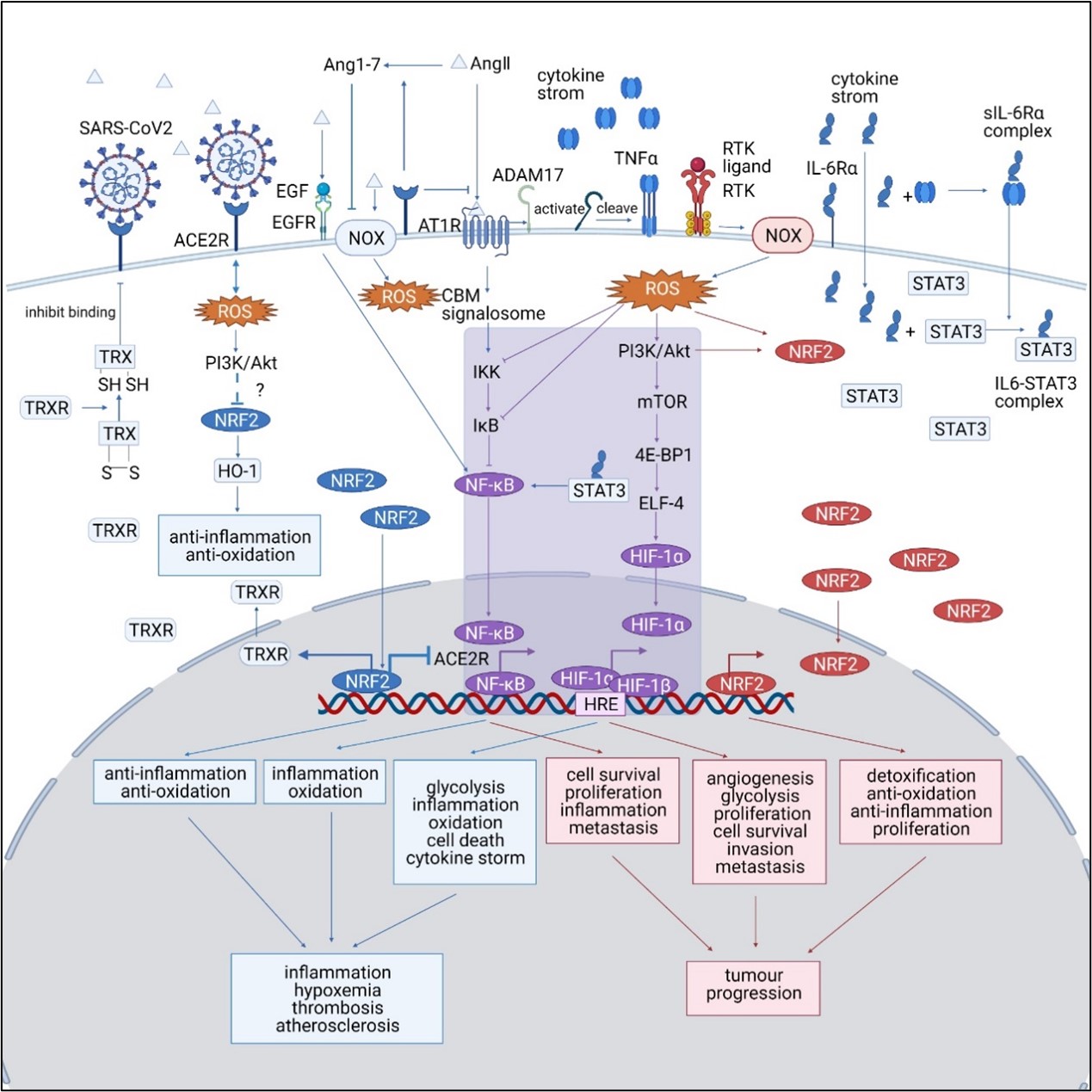Recently, two undergraduate students from Zhejiang University-University of Edinburgh Institute (ZJE) in Dr. Jian Liu’s research group published a review entitled “Comparison of COVID-19 and Lung Cancer Via Reactive Oxygen Species Signaling” at Frontiers in Oncology. This article reviews the role of reactive oxygen species (ROS) and their associated signaling pathways, NRF2, HIF-1, and Nf-κB, in the pathogenesis of COVID-19 and lung cancer (Figure 1) and suggests the interplay between the two diseases. The HIF-1 and Nf-κB pathways are upregulated in both diseases, leading to inflammation, oxidation, tumor cell proliferation, and metastasis. Thus, the authors suggest that targeted therapies to these pathways, such as miRNA and plant-derived chemicals, are attractive and deserve further study in treating both diseases.

Given that COVID-19 and lung cancer are two severe pulmonary diseases that cause millions of deaths globally, understanding the dysregulated signaling pathways between them can benefit treating the related patients. Our work emphasizes the significance of ROS in the two mutually impacted pulmonary diseases and would provide a clue in developing more novel preventive and therapeutic strategies for them.
Dr. Jian Liu is the corresponding author of the article. Undergraduate students Zilan Zhu and Ziyi Zheng (2018 entry) from ZJE are co-first authors. Of note, although the ZJE undergraduates are almost fulfilled with multiple education tasks, this review was finished by them within six months. Access to the publication: https://www.frontiersin.org/articles/10.3389/fonc.2021.708263/abstract
In June 18th 2021, Dr. Jian Liu published an article entitled “Dependency of human and murine LKB1-inactivated lung cancer on aberrant CRTC-CREB activation” at Elife as a co-author. this study provides direct proof for an essential role of the CRTC-CREB activation in promoting the malignant phenotypes of LKB1-null lung cancer and proposes the CRTC-CREB interaction interface as a novel therapeutic target. Access to the publication:
https://elifesciences.org/articles/66095
At the end of March 2021, Jian Liu’s lab and Aifu Lin’s lab in College of Life Science, Zhejiang University, published an article entitled “LncRNAs: Architectural Scaffolds or More Potential Roles in Phase Separation” at Frontiers in Genetics together. This article reviews the functions of phase separation and associated studies of lncRNAs. This review will facilitate our understanding of the formation and function of phase separation and the role of lncRNAs in these processes and related biological activities. A deeper understanding of the formation and maintaining of phase separation will benefit disease diagnosis and treatment. Dr. Jian Liu is the co-corresponding author of the article. Postgraduate student Feiran Gao (2020 entry) from ZJE is a co-author. Access to the publication: https://www.frontiersin.org/articles/10.3389/fgene.2021.626234/full
In early March 2021, Dr. Jian Liu published an article entitled “Progesterone receptor isoform B regulates the Oxtr-Plcl2-Trpc3 pathway to suppress uterine contractility” at PNAS as a co-author. In this study, a novel transgenic mouse model was established to reveal the mechanism of uterine contraction. Access to the publication: https://www.pnas.org/content/118/11/e2011643118/tab-article-info
In January 2021, Dr. Jian Liu published an article entitled “Mitochondrial long non-coding RNA GAS5 tunes TCA metabolism in response to nutrient stress” at Nature Metabolism as a co-author. In this study, the authors investigated the molecular mechanism of mitochondrial lncRNAs regulating TCA metabolism in response to nutrient stimulation. Access to the publication: https://www.nature.com/articles/s42255-020-00325-z
About Jian Liu’s lab (https://person.zju.edu.cn/liujian;)
Dr. Jian Liu’s lab studies cancer biology, epigenetics, and gene editing and aims to promote the targeted therapy of squamous cell lung carcinoma. Currently, the lab explores the molecular mechanism of lung cancer (especially squamous cell lung carcinoma) through the combination of clinical database, transgenic mouse models, and sequencing. Dr. Jian Liu’s E-mail address: JianL@intl.zju.edu.cn; Look for the self-motivated Postdocs.







